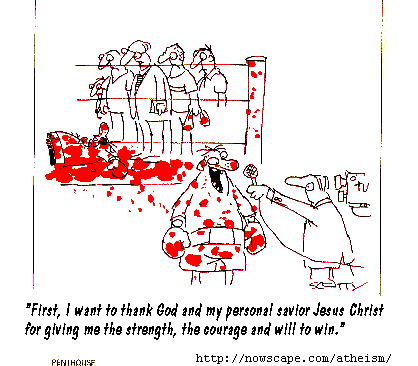On the net Since 1994


Governmental Prayer
| ~~@Com~~ On the net Since 1994 |

|
 |
Governmental Prayer |
|
Opponents Getting Ready to Fight Prayer With Prayer |
The Salt Lake Tribune |
|
| Father in Heaven . . . Hail Mary . . . Amen. Such words are common in prayer. But they represent uncommon ammunition for opponents of invocations at Utah government gatherings. And with the Salt Lake County Council's recent 6-3 vote to resurrect prayer at its meetings, critics have plenty of explosive ordnance at their disposal.
But Allen and other members of his nonbeliever brigade had plenty of ideas at the
meeting they convened Sunday at Salt Lake City's Encore Grill. Chief among them: Recruit volunteers to offer the kind of prayers that might give county leaders second
thoughts about beginning meetings with invocations. Satanists, druids and pagans top Utah Atheists' list of prayer candidates. In
keeping with the spirit of the occasion, Allen wants to enlist a member of the American Indian Peyote cult. "The County Council should pass the peace pipe amongst themselves," Allen
said. "It's amazing what groups we have here . . . that would be considered pagan." What's more, Allen insists he is not blowing smoke. He said he has tracked down one Satanist who did not have the courage to be the guinea pig for the group's prayer challenge. But the group already has contacts with plenty more representatives of the heathen horde.
|
Specifically, he wants to revive the mocking prayer
Snyder had hoped to offer at a Murray City Council meeting in 1994. The city refused and a federal court upheld that decision, but the jury is still out on the issue in
state court. Barnard wants to give his client's prayer -- addressed to "Mother in Heaven" and filled with damning rhetoric about self- righteous and self-
serving politicians - - another chance in a new venue. Perhaps in Salt Lake County. Indeed, Barnard views the County Council's vote on prayer as a heaven-sent opportunity.
If Allen and Barnard carry out their plans, Salt Lake County officials may elect to
throw the rule book at them. Councilmen David Wilde and Steve Harmsen are drafting a prayer policy [emphasis,
ED.] they hope will promote diversity while maintaining order and decorum. The county may
anoint a prayer coordinator whose job will be to select people to pray and teach them the legally correct method of offering invocations. What about Satanists? "The purpose of prayer is to be uplifting," Harmsen said. "If the
stated objective of a group is to be divisive, we'll probably give them that opportunity. But I don't think we would roll out the welcome mat for them." Harmsen said the council is united in its resolve that prayer-givers be a diverse bunch.
Reprinted with permission. Original article from Feb 7, 2001 is at |
|
|
|
||
|
|
Judge Dismisses Murray Prayer Suit BY STEPHEN HUNT |
The Salt Lake Tribune February 15, 2001 |
| Seven years after it began, Tom Snyder's quest to pray to
his "Mother who art in heaven" at a Murray City Council meeting has reached the doorstep of the Utah Supreme Court. In a decision released this week, 3rd District Judge Stephen Henriod ruled against
Snyder, saying his proposed statement was "not a prayer" and was "clearly nonreligious." Snyder now will appeal to the state's highest court, the latest move in his lengthy
legal battle. A federal judge first dismissed Snyder's lawsuit against the city of Murray, a decision upheld in 1998 by the 10th U.S. Circuit Court of Appeals. After the
U.S. Supreme Court declined to hear his
"Once you allow a person or group to offer a prayer, you have to let everybody
do it," Barnard said Wednesday. But attorney Rick Van Wagoner, representing Murray City, insists the opening prayer
is intended to encourage lofty thoughts and focus attention on "We can't bring druids in and have a ceremony sacrificing a chicken," Van
Wagoner said. "We don't want to make it a circus sideshow." The case began in 1994 when Snyder sued the city of Murray after its officials
refused to let him give a proposed prayer considered by city leaders to be disparaging and disrespectful. Snyder's attempt followed close on the heels of a 1993 Utah
Supreme Court decision that allowed Salt Lake City to have an opening prayer at council meetings. But Van Wagoner said Salt Lake City abandoned the practice when faced with a request from Snyder, who wanted to offer a statement asking "our Mother in heaven" to "prevent these self- righteous politicians from misusing the name of God in conducting government meetings." Snyder then turned to Murray.
"Murray City didn't back down, they decided to accept the challenge," Van
Wagoner said. "And here we are." Relying largely on the landmark 1993 Utah Supreme Court case known as Society of
Separationists vs. Whitehead, Henriod said Snyder's proposed prayer constituted "proselytizing, in that its purpose is to encourage others to criticize Murray City's
[prayer] policy." Van Wagoner called Henriod's ruling "a victory for common courtesy." Barnard responded to Henriod by filing notice of his intent to appeal the trial
judge's ruling to the Utah Supreme Court. Barnard said he will claim Henriod "mis- understood, misconstrued and
misapplied" the Society of Separationists ruling, which allowed prayer at Salt Lake City council meetings -- but only if the same forum is available to everyone. "You cannot censor a prayer based on the belief system of the person offering
it," Barnard said. "And that's exactly what Murray did, and that's
|
||
|
|
||

|
One person's faith contradicts another's faith, so it can be of no value |
|
|
But whenever you pray, go into your room and shut the door and pray to your Father who is in secret; and your Father who sees in secret will reward you. " Matthew 6:6 |